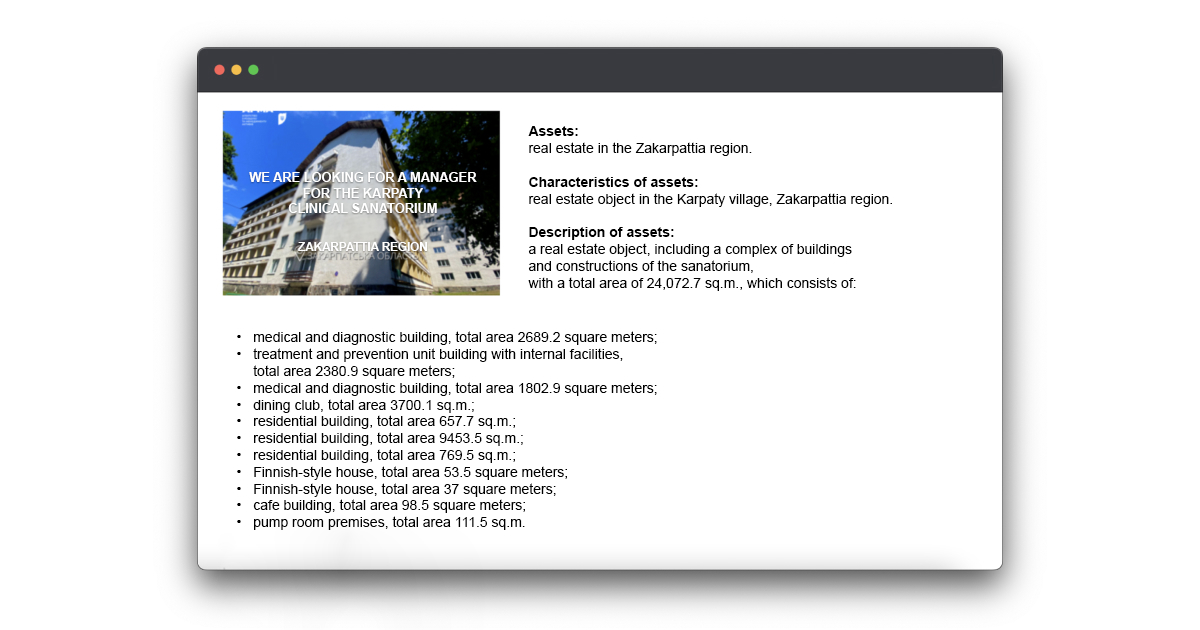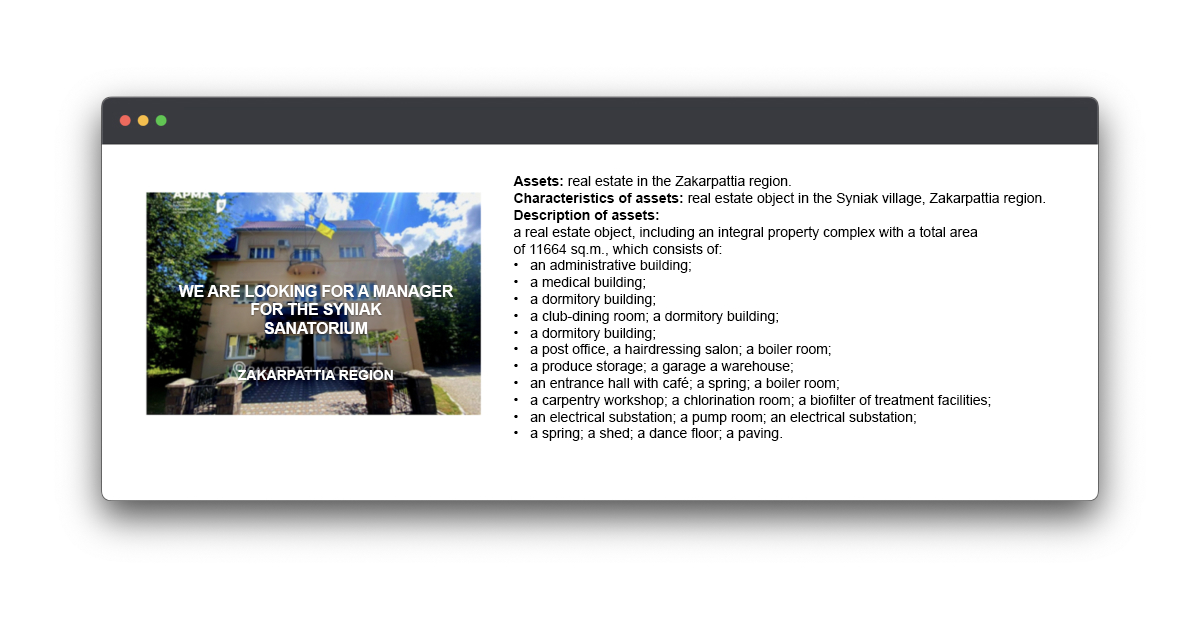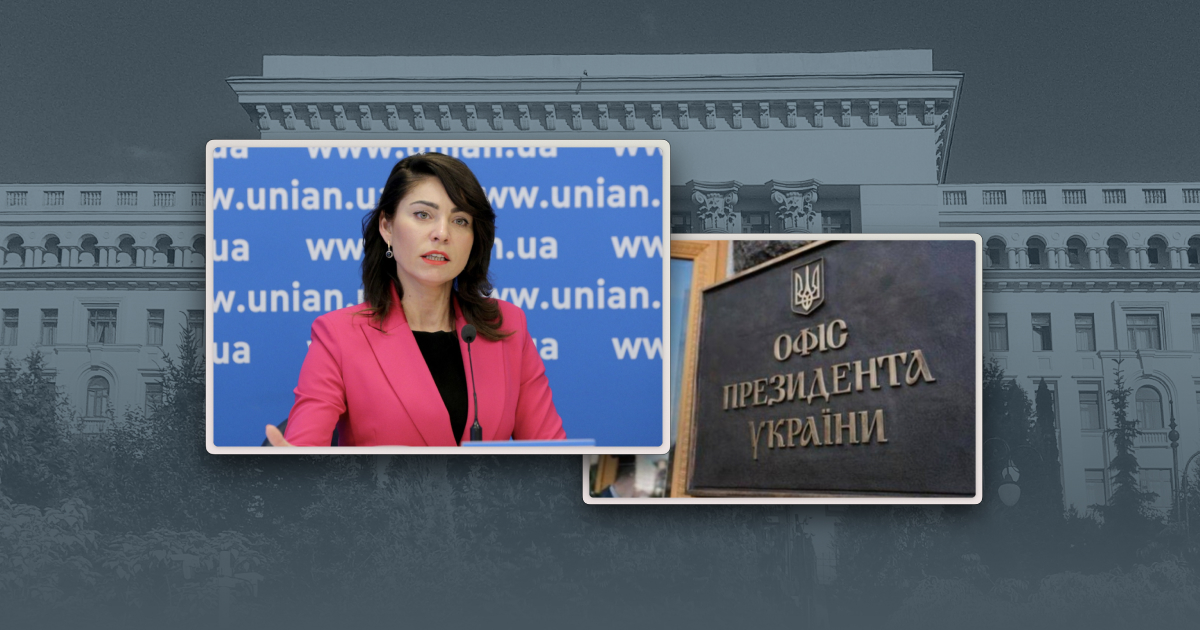Where do confiscated Russian assets end up? The story of the (in)action of the Asset Recovery and Management Agency

The main functions of the Asset Recovery and Management Agency are to search for property that can be seized in criminal proceedings and to manage already seized assets to preserve or increase their economic value. Since the start of the full-scale invasion, confiscated assets of Russians, Belarusians, and Ukrainian collaborators worth tens of billions of hryvnias have been transferred to the Agency, but the income from them in 2022 was about 35 million hryvnias.
Seized assets have been unused for months and do not generate income, tenders for property managers contain corruption risks, and people's deputies and NGOs speak directly about the inefficiency and lack of transparency of the agency.
The new Head of ARMA, Olena Duma, has already issued orders that should improve the Agency's work, but even her appointment has raised doubts among the Public Council and outrage among anti-corruption organisations.
Here's how ARMA manages seized property and whether we can expect changes after the appointment of the new head.
"There are no exact numbers"
Yaroslav Zhelezniak, Chairman of the Temporary Investigation Commission of the Verkhovna Rada: What objects, worth what amount, and in what quantity were transferred to you (ARMA — ed.) by law enforcement agencies?
Oleksii Tamozhanskyi, Head of the ARMA Asset Management Department: The amount of the asset to be transferred to management is determined after the manager is selected and the assessment is carried out.
Yaroslav Zhelezniak: Then tell us the number of assets transferred to ARMA.
Oleksii Tamozhanskyi: In 2022, 557 contests were announced [to select a manager of seized state property].
Anastasiia Radina, Head of the Verkhovna Rada Committee on Anti-Corruption Policy: You were asked a clear question. Law enforcement agencies spoke before you, and each of them said how many objects of what type they had transferred to you. Only ARMA cannot give a clear answer.
Oleksii Tamozhanskyi: Over 20,000 items of movable property have been transferred to [ARMA's] management…
Danylo Hetmantsev, Chairman of the Verkhovna Rada Committee on Finance, Taxation, and Customs Policy: What does "over 20,000" mean? Both 30,000 and 100,000 are more than 20. You are the body that keeps records of this property. Tell us the number.
Oleksii Tamozhanskyi: As of 01.04 [2023], about 25,000 items of movable property were transferred to ARMA's management. I may be mistaken about the exact numbers... This is a dynamic stage: the number is constantly changing, as arrests are revoked.
Danylo Getmantsev: You cannot make a mistake. As of a certain date, there is a definite and specific number. You don't know the number of assets you have and don't manage the process.
Yaroslav Zhelezniak: Where can I, as a citizen of Ukraine, see the list of property seized and transferred to you?
Oleksii Tamozhanskyi: You can send a request for access to public information. The register is being maintained and updated, but access to it is limited due to martial law.
This is a fragment of the May 23 meeting of the Temporary Investigation Commission (TIC) on confiscated Russian assets.
In December 2022, the Verkhovna Rada established the TIC to investigate possible violations in the area of economic security.

At the beginning of the meeting on May 23, law enforcement officers from the Security Service, the State Bureau of Investigation, the Bureau of Economic Security, and the National Police reported on how much property had been transferred to ARMA following the investigation.
TIC chairman Zhelezniak summed up the value of the assets transferred by law enforcement at more than ₴70 billion. The next day, during a briefing, the then-acting Head of ARMA, Dmytro Zhoranovych, partially announced the types and number of objects the Agency had received to manage but did not disclose their value.
"Real estate — 1994 objects, including 237 objects in the occupied territory, 273 objects transferred under a management agreement. Movable property — 26,503 units. I have now provided the statistics that the deputies actually wanted to hear. But I have a question: "What happened after I announced these figures? What is this information for?" Zhoranovych said.
The ARMA management points out that about 80% of the assets transferred to the Agency by law enforcement agencies are exclusively corporate rights: no physical property and impossible to manage without the owner's consent. At the above-mentioned meeting, Oleksii Tamozhanskyi estimated the assets that could be transferred to managers at ₴5 billion.
Svidomi sent a request to ARMA to find out the number and amount of assets managed by the Agency and how much has already been transferred to managers. At the time of publication, no response was received.
Zhelezniak also cited data from the StateWatch organisation, according to which the state received ₴34.8 million of seized assets from the management in 2022. Tamozhanskyi confirmed this number.
"Come here, my dear, we'll make a deal"
ARMA is also looking for managers for seized property. These are entrepreneurs who already have successful commercial experience in a particular market for goods and services. They must maintain and, if possible, increase the amount of income generated by the seized property. The manager does not appropriate the assets but receives interest on the profits.
Oleksii Tamozhanskyi noted that in 2022, ARMA announced 557 competitions for asset managers, and only 15 were selected for an unknown number of assets. The next day, Zhoranovych gave other data: 324 tenders have been announced since the beginning of last year.
Let's say I own a chain of health resorts in the Zakarpattia region. I have been in this business for a long time, and it brings good profits. I found out that several resorts in my region have been seized, and they are looking for managers. Why not use my experience?
I open my laptop, go to the ARMA website and see a tab with competitions for managers and implementers. The Karpaty Clinical Sanatorium in the Zakarpattia region is just what I needed. The asset inventory lists at least 20 premises, as well as petrol stations, waste ponds, sports grounds, and other real estate. I look at the photos — there are only nine of them and only one of them inside the building. The description of the property is limited to the area and purpose of the buildings. There is little information.

I continue looking through the pages and see another sanatorium in the Zakarpattia region — Syniak. There is no information on the area of individual assets or photos of the inside of the sanatorium.

Let's move on to the country's capital. In the centre of Kyiv, near Maidan Nezalezhnosti, there is the October Palace International Centre of Culture and Arts. It is not unused — the concert.ua website alone has a poster full of events scheduled until December. But the ARMA is also looking for a manager for the building complex. The available information includes the total area, the street name of the complex, and three photos, two of which are of the outbuildings. A visitor to any event can learn more about the complex than a potential manager can from the ARMA website.

What if I can't go to the sites to see them myself? According to the website, potential managers can find out detailed information by sending an email to ARMA.
According to the Agency's representative, Tamozhanskyi, after receiving a response, one must come to ARMA to review the documents on the seized asset. The manager is selected by an ARMA commission formed within the Agency. There is no competitive selection procedure, as well as no criteria and methodology for evaluating participants' proposals.
"The creation of conditions for mandatory personal contact between individuals and government officials is a corruption factor. Essentially, ARMA creates corruption risks [of personal contact]. It looks like an invitation: 'Come here, my dear, we'll make a deal'," Anastasiia Radina, Head of the Verkhovna Rada Committee on Anti-Corruption Policy, commented on the procedure.
The new Head of the ARMA, Olena Duma, has already ordered to develop a competitive selection procedure.
Asset Disappearance Agency
From the moment the property is seized by a court order until it is handed over to the asset manager, no one is responsible for its maintenance: the former owners cannot do so because the property is seized; law enforcement is not responsible for the assets because they have been transferred to ARMA; and ARMA does not monitor the assets because it "does not have the resources to hire guard services." Until the assets are handed over to managers, they may remain idle and generate no income.
Aerok LLC, owned by Russian oligarch Andrey Molchanov, was seized on July 1, 2022. Three factories for the production of autoclaved aerated concrete blocks, real estate and immovable property, bank accounts, and corporate rights worth more than ₴2 billion were transferred to the ARMA. Molchanov, according to the SBU, is a member of the Russian president's inner circle and also sponsors the election campaign of the United Russia party.
The manager was chosen only six months later — in January 2023, Kharkiv Building Materials Corporation was selected as the winner of the tender. Even after that, the plants were not transferred to the corporation for months, as "the evaluation procedures were ongoing, after which a contract would be concluded." Eventually, a group of analysts from Trap Agressor found out that the former management was plundering the seized enterprise while it was idle.
Or let's take a look at Bank Forward, which was owned by Russian businessman Rustam Tariko. According to the National Bank of Ukraine, as of May 1, 2021, Bank Forward's assets amounted to almost ₴2.5 billion. In July last year, the bank was seized and transferred to the ARMA. Bank Forward went bankrupt under ARMA's management, and on February 7, the National Bank declared it insolvent.

ARMA — to be or not to be?
Managing a large number of assets tempts people into corruption. ARMA has already discredited itself with this. The first head of the Agency, Anton Yanchuk, is suspected of embezzling over ₴426 million. After him, the Agency was headed by Vitalii Syhydyn, who was suspected of embezzling more than $400,000. Since August 2021, Dmytro Zhoravovych has been acting as head of the ARMA. In 2022, the contest for the new head ended with the commission failing to select a worthy candidate, so this year, the new head was elected.
Members of Parliament questioned the need for ARMA to exist in the form it does today. In particular, Davyd Arakhamiia and Oleksandra Ustinova spoke about the dissolution of ARMA; the head of the TIC, Yaroslav Zhelezniak, called ARMA a "God-damned place."
Danylo Hetmantsev announced a draft law on the dissolution of the Agency. The decision, according to Hetmantsev, was made by Zelenskyy. The functions of the ARMA were to be transferred to the State Property Fund, and the seized objects were to be disposed of through Prozorro.Sale, as ARMA currently conducts auctions through Prydniproviie 2021 LLC and National Electronic Exchange LLC.
Four months have passed since this statement. ARMA is still operating, and Olena Duma, who is linked to the Presidential Office, won the competition for the position of head of the Agency.

6 out of 8 members of the selection committee voted for the former deputy head of Chernihiv Regional State Administration. Following this, Transparency International Ukraine said that Duma's appointment "could put an end to ARMA" and called on the Cabinet of Ministers not to vote for the appointment. Anti-corruption activists pointed to the lack of necessary experience, alleged business contacts with high-profile criminals, and bias.
During the 2019 election campaign, Duma openly campaigned for Volodymyr Zelenskyy. During a press conference before her appointment as Head of the ARMA, Duma called the Poroshenko-era government "criminal" and Zelenskyy "a man who changed the history of mankind" and thanks to whom "Ukrainians are heard, known, and respected all over the world". Duma denied any links to the Presidential Office and called the articles against her "sponsored."
After the publications by anti-corruption activists, commission member Dmytro Ostapenko withdrew his vote for Olena Duma. He wrote that at the time of voting, he did not have full information about the candidate, "which was crucial and shocking to him." Duma called it "undermining the legal system of the state" and claimed "enormous pressure on the members of the selection committee and the government to keep the acting commissioner in place and to continue corruption schemes."
The G7 ambassadors wrote that they had noted the concerns of civil society and called for "due procedures to be followed to build trust in ARMA." Nevertheless, on June 30, the Cabinet of Ministers appointed Olena Duma to the post.
"This means that out of the 6 votes needed to win, Duma received only 5. However, if there is an order from the Presidential Administration, then [Prime Minister Denys] Shmyhal does not care about the law or maths. Now the most interesting part is coming. Apart from the president, only Andrii Yermak could have swayed the government to do this before. So this is most likely his case," wrote Vitalii Shabunin, Head of the Anti-Corruption Action Centre.
In office, Duma has already adopted decisions that should improve the work of the ARMA: she initiated the creation of a commission for external control of the Agency and the opening of the Register of Seized Assets, instructed to develop a procedure for competitive selection of asset managers and to publish documents on access to public information in accordance with the law.
People's Deputies of the Anti-Corruption Committee registered draft law No. 9515 in the Verkhovna Rada. It proposes to conduct an annual external assessment of the ARMA's performance. The evaluation commission will consist of representatives of the State Financial Monitoring Service, representatives of the Prosecutor General and the Chairman of National Anti-Corruption Bureau of Ukraine, and people appointed by the Cabinet of Ministers based on proposals from international and foreign organisations.
In addition, if the draft law is passed, it obliges ARMA to open access to the Register of Seized Assets by December 1 this year. If not, Olena Duma's term of office will be terminated before the end of December.


